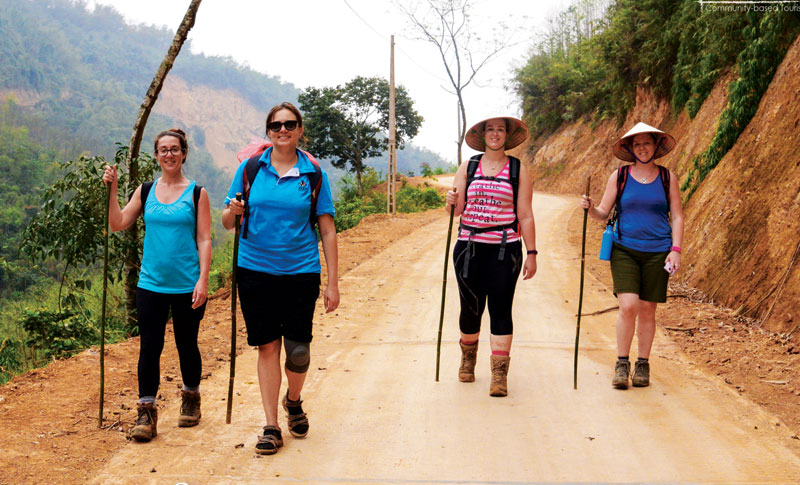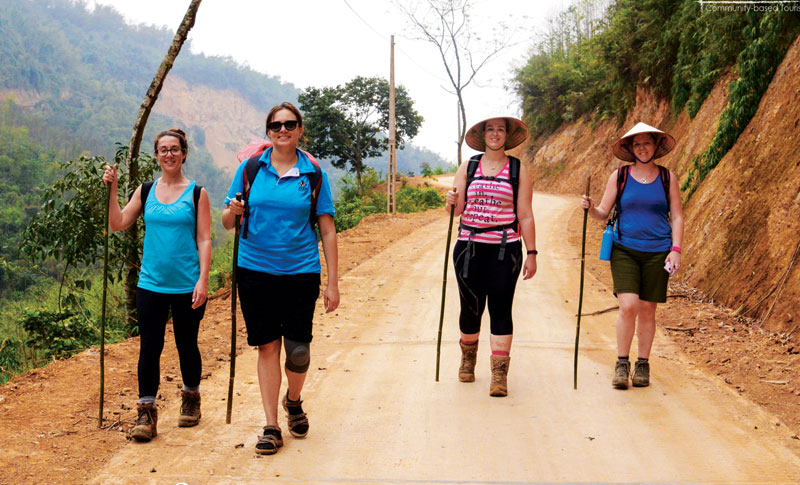
(HBO) – Being located near the reservoir of Hoa Binh Lake, there have been some long lasting customs of traditional self- supplying, from planting corns, cassava, forest trees and living in the houses with meticulous brocade weaving of a dress made from traditional materials for months. Those are the typical characteristics of Dao ethnic people in Sung village, Cao Son commune (Da Bac), which have been lasting for thousands of years.

Walking
through the forest near the lake reservoir of Da River in Sung village, Cao Son
commune (Da Bac) is a favourite activity of the foreign people.
The original houses are located on the hillside overlooking the
lake of Da River. Almost all architectures remain unchanged. The traditional
house of Dao ethnic people is half-house, half-land. Dao ethnic people have
typical cultural characteristics of the people through the rituals and taboos
in the house – building and in the process of residence.
Mr. Ly Van Nghia, Head of Sung Hamlet, said: "We have not
known the time when Dao ethnic people started to settle here. According to previous
olders’s storytelling from hundreds or thousands of years, the people had lived
in this area. They live on forests, on hills and rivers. Up to now, there are
74 Dao ethnic families living together. Almost all households do not lock the
door when sleeping because the security here is very good. People can leave many
valuable assets such as motorcycles in the yard without fear of losing.
When coming back here, my feeling was that almost the women in the
village still wear their traditional costumes at home as well as at work. Ms.
Ly Thi Sinh, more than 40 years old, said: No one told us but that was our
custom, most of the women who have families and are more than 40 always wear
their ethnic costumes even though we wear modern costumes when we were young.
That is the reason why the traditional weaving of Dao ethnic people is still
being kept after a long history up and down. In order to have that kind of
costumes, the woman selected the materials, embroidered every detail, took
months to complete her clothes.
The latest thing when we came here was the homestay house.
Although it has not been operated for nearly a year, foreign visitors cannot
miss this place. Mr. Dang Van Xuan, a homestay owner said: The traditional
culture of house architecture, costumes, landscapes, lifestyle and tourist
destination intervals is the attraction of foreign tourists when coming here.
My family used to grow corn, cassava, vegetables and forest trees. Since there
was a project supporting tourism activities, we attended. Despite of newly
operation, the family has welcomed many guests. Sometimes, at weekends, there
are such crowded tourists that there are not enough accommodations. We look
forward to welcoming more and more visitors. Foreign tourists coming to Sung
village enjoy the activities close to the nature, relaxing among the hamlet of
Dao Tien ethnic people, eating ethnic dishes, visiting the Lady Hoang Lan Cave
on Bieu mountain. For those who like exploring and moving, they will wade the
stream and catch fish, walk through the jungle along the reservoir of Da River.
This is an unforgettable interesting experience.
Mr. Nguyen Van Hien, Head of Department of Culture and Information
of Da Bac District said: From the beginning of 2017, AFAP organization of
Australia continued to support 2 households in Sung village, Cao Son commune to
implement community tourism. The project supports the houses maintenance,
environmental sanitation, the method of doing community tourism. The project
has trained, practiced the skills of cooking, guides ... supported loans to
upgrade the house, brocading services, produced some products such as tea,
honey ... upgrading infrastructure, designing tours, walking route
interconnecting Sung village and Ke village, Hien Luong and other villages. From
this support, people have changed their minds of thinking about economizing
from tourism. Tourism also supports to develop agriculture with local products.
A good sign in the next year is that AFAP organization has
collaborated with the Asian travel agency Peaktreval to bring more than 2,000
visitors to view the community tourism in Sung Hamlet.
A diverse chain of eco-tourism and resort destinations concentrated in Hoa Binh city and the districts of Tan Lac, Da Bac, and Luong Son… Along with the launch of several key high-quality resort tourism projects, these developments have reshaped the landscape and enhanced the appeal of Hoa Binh as a travel destination.
Boasting diverse terrain, a mild climate, and rich natural resources, Cao Phong district is increasingly asserting its place on Vietnam’s tourism map, attracting both domestic and foreign visitors. The district is renowned for its stunning landscapes, majestic mountains, a crystal-clear hydropower lake, and the unique cultural identity of local ethnic groups.
With its pristine landscapes, unique cultural heritage of Muong ethnic minority, and an expanding range of visitor experiences, Tan Lac district of Hoa Binh has fast become a captivating destination for both domestic and international tourists.
Until now, Sung village in Cao Son commune, Da Bac district remains the only Dao ethnic community in Hoa Binh province to develop a community-based tourism model. Beyond its untouched natural landscapes, cultural identity serves as the cornerstone attraction for visitors.
Alongside the diverse cultural identities of the Kinh, Muong, Tay, Thai, Dao, and Mong ethnic people, Hoa Binh province is also renowned as the "capital" of the northwestern Vietnamese cuisine, offering unique and distinctive dishes. At festivals, during Lunar New Year (Tet), or on significant family or community occasions, special dishes are prepared, leaving a lasting impression on visitors.
A Phong Linh (Yellow Tabebuia) flower garden in Thang village, Thach Yen commune, Cao Phong district is currently in full bloom, drawing a large number of visitors.



